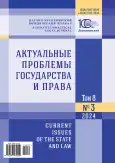Non-traditional ways of obtaining information (using hypnosis as an example) in the investigation of crimes: yes or no?
- Authors: MEDVEDEVA S.V.1, MENTYUKOVA M.A.2
-
Affiliations:
- Tambov State Technical University
- Derzhavin Tambov State University
- Issue: Vol 8, No 3 (2024)
- Pages: 443-450
- Section: Процессуальное право
- URL: https://journal-vniispk.ru/2587-9340/article/view/303420
- ID: 303420
Cite item
Abstract
Currently, three main points of view have been formulated in scientific circles on the possibility of using non-traditional methods of obtaining forensic information: in the criminal proceedings framework, the use of non-traditional methods to obtain information is unacceptable; the use of non-traditional methods to obtain information in the criminal proceedings field is permissible; the use of non-traditional methods to obtain information in the field of criminal proceedings is permissible only in extreme cases for the most high-profile criminal cases, when it is not possible to obtain information in any other way. However, it is important to note that many of these study fields are officially considered pseudoscientific. Despite this, the public interest in extraterrestrial forces, their potential influence on human consciousness and overall life is continuously fuelled by media publications, television programs, and other sources. At the same time, there are still widespread beliefs among people regarding the possibility of individual possession of supernatural abilities, such as hypnosis and palm reading, among others. In light of the above, issues related to the use of non-traditional techniques for obtaining criminal intelligence (for example, through hypnosis) in investigative work are being explored. Like any other activity, the use of non-traditional methods for obtaining information and their significance in the disclosure and investigation of criminal offences is not free from specific characteristics and challenges. 1) There are issues that arise during the selecting stage an investigator’s technique for obtaining information. One such issue is the concern of the investigating officer regarding the unconventional methods’ use of information acquisition. In this regard, we are not referring to methods that may harm human health or life, or pose a threat thereof (the inappropriateness of their use is undisputed). 2) There are challenges related to the lack of regulatory guidance on the process of utilizing unconventional information gathering techniques (with the exception of the polygraph). 3) There are problems arising at the stage of assessing the validity of information obtained through unconventional methods, and the possibility of establishing its investigative significance. 4) There is a perception among the general public that persists despite scientific refutation, regarding the existence of supernatural forces. These circumstances determine the significance of the research topic. The issues of both theoretical and practical significance are identified, solutions to address these issues are proposed, and recommendations to enhance the effectiveness of investigative activities through the use of non-traditional techniques are developed. Research methods: observation, description, comparison, analysis and synthesis, deduction and induction, generalization, analogy, etc. The empirical basis of the study is the materials of investigative and judicial practice. The purpose of the study is to analyze the problems that arise when using non-traditional methods of obtaining information, along with their subsequent evaluation and the feasibility of utilizing them as evidence in criminal cases.
About the authors
Svetlana V. MEDVEDEVA
Tambov State Technical University
Author for correspondence.
Email: Sv-medvedeva@mail.ru
ORCID iD: 0000-0002-7972-5893
PhD (Law), Associate Professor, Criminal Law and Applied Computer Science in Jurisprudence Department
Russian Federation, 106 Sovetskaya St., Tambov, 392000, Russian FederationMarya A. MENTYUKOVA
Derzhavin Tambov State University
Email: mariya_men2003@mail.ru
ORCID iD: 0000-0001-8639-2559
PhD (Law), Associate Professor, Criminal Law and Applied Computer Science in Jurisprudence Department
Russian Federation, 33 Internatsionalnaya St., Tambov, 392000, Russian FederationReferences
- Grimak L.P. (1997). Gipnoz i prestupnost’. Moscow, Respublika Publ., 304 p. (In Russ.)
- Lazareva V.A. (2017). S.A. Sheifer. The concept of evidence formation. Yuridicheskii vestnik Samarskogo universiteta = Juridical Journal of Samara University, vol. 3, no. 4, pp. 43-48. (In Russ.) https://elibrary.ru/uscbbw
- Smol’kova I.V. (2017). Unconventional methods of crime detection and crime investigation from the perspective of processualist. Kriminalistika: vchera, segodnya, zavtra = Forensics: Yesterday, Today, Tomorrow, no. 1 (1), pp. 62-67. (In Russ.) https://elibrary.ru/xnarhf
- Drapkin L.Ya., Zlochenko Ya.M., Shuklin A.E. (2003). On the possibilities of using modern information technologies in the investigation of crimes. Vestnik kriminalistiki = Bulletin of Criminalistics, no. 3 (7), p. 26. (In Russ.) https://elibrary.ru/gtyzsf
- Kitaev N.N. (2007). Non-traditional methods of crime detection and investigation. Voprosy kriminalistiki, no. 4, pp. 41-48. (In Russ.)
- Obraztsov V.A., Bogomolova S. N. (2002). Kriminalisticheskaya psikhologiya. Moscow, YUNITI-DANA Publ.; Zakon i pravo Publ., 447 p. (In Russ.)
- Evstigneeva O.V., Ivanov A.N. (2004). Problems of using hypnosis in criminal proceedings. Vestnik kriminalistiki = Bulletin of Criminalistics, no. 2 (10), pp. 78-80. (In Russ.)
- Grimak L.P., Skrypnikov A.I. (1996). The possibilities of using “investigative hypnosis” to solve crimes. Psikhopedagogika v pravookhranitel'nykh organakh = Psychopedagogics in Law Enforcement, no. 2 (4), pp. 23-25. (In Russ.) https://elibrary.ru/nrllvd
- Yashin A.V., Martyshkina Yu.V. (2019). The use of knowledge of psychology and psychiatry in the detection and investigation of crimes. Vestnik Penzenskogo gosudarstvennogo universiteta = Vestnik of Penza State University, no. 2 (26), pp. 19-24. (In Russ.) https://elibrary.ru/dvuoes
- Kitaev N.N., Kitaeva V.N. (2018). Use of hypnosis in search of a dead body: problematic issues. Zakon i pravo, no. 12, pp. 142-144. (In Russ.) https://doi.org/10.24411/2073-3313-2018-10289, https://elibrary.ru/yopadb
- Grimak L.P. (2016). Modelirovanie sostoyanii cheloveka v gipnoze. Moscow, URSS Publ., 272 p. (In Russ.)
- Karpenko O.A. (2018). Unconventional special knowledge in exposing the false testimony of witnesses and victims. Vestnik Vostochno-Sibirskogo instituta MVD Rossii = Vestnik Eastern Siberia Institute of the Ministry of the Interior of the Russian Federation, no. 1 (84), pp. 125-130. (In Russ.) https://elibrary.ru/yrtuns
- Vestov F.A., Fast O.F. (2021). Improving individual institutions of the rule of law for the purposes of economic and social well-being in Russia. Osnovy ehkonomiki, upravleniya i prava = Economy, Governance and Law Basis, no. 1 (26), pp. 64-68. (In Russ.) https://doi.org/10.51608/23058641_2021_1_64, https://elibrary.ru/kfbqvw
Supplementary files








